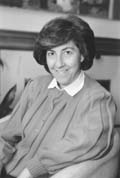Community outreach

The Department of Jewish Studies is doing its part to make the academy seem a little less standoffish to those outside the Roddick Gates. To mark its 30th anniversary, the department has organized a lecture series called "The Academy Reports to the Community." The lectures will present top Jewish studies scholars from across North America, discussing their areas of expertise. The talks are aimed for a lay audience interested in Jewish matters.
September 10th saw the start of this series, with a lecture given by Harvard University's Ruth Wisse, an acclaimed author and former McGill professor. About 100 people turned out, a promising start to the series according to Professor Gershon Hundert, chair of Jewish studies and the chief organizer for the lectures.
The next speaker will be Vassar College's Deborah Dash Moore, co-editor of The Encyclopedia of Jewish Women of America. She will discuss the state of North American Jewish Studies on October 22 at Congregation Tifereth Beth David Jerusalem, 6519 Baily Road, Côte St Luc.
In November, ChaeRan Freeze of Brandeis University will talk about Jewish women in Russia. Robert Goldenberg from State University of New York, Stony Brook, will speak in March on ancient Judaism and in April, the University of Toronto's Derek Penslar will lecture on Israel studies. In a final conference in May, the most recent developments in Judaism will be discussed.
Hundert hopes that "The Academy Reports to the Community" will be a "kind of template" for other university departments interested in nurturing greater communication between scholars and the general public.
The series is co-sponsored by the Jewish Community Foundation of Montreal and supported by Alex Soyka. The lectures are free, but donations are accepted towards their cost. For more information call 398-3905.
Hanna Rabinovich
|




